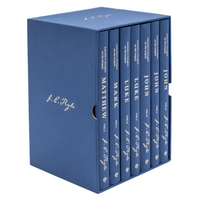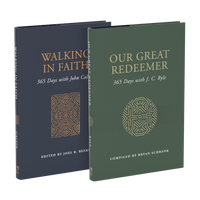
J.C. Ryle Classics Bundle
- Affordable shipping (free $100+)
- 100,000+ customers served
- "Wonderful books, great prices, awesome customer service." – Ivan, IL
The Christian Race
When the aged J. C. Ryle announced he was to resign from the office of bishop of Liverpool, his friends encouraged him to publish a selection of sermons as a memorial to his sixty years of ministry, from country parson to diocesan bishop.
The resulting selection, chosen by one of Ryle’s colleagues in the Liverpool diocese, T. J. Madden, exemplifies the beating heart of biblical religion which epitomized Ryle’s approach to ministry. The title of the selection is taken from one of the sermons, and the themes covered in this volume will be found to equip readers, as they did their first hearers, to run the Christian race with endurance.
Themes such as regeneration, saving faith, righteousness, the character and privileges of the true Christian, the character of Jesus Christ, and heaven, among others, all serve to draw out the doctrinal teachings of the Scriptures, whilst applying those teachings to the practical realities of the Christian life.
Readers familiar with Ryle’s other works, including his Expository Thoughts on the Gospels, Holiness, Practical Religion, and Knots Untied to name but a few, will recognize in these sermons that same clarity of expression and practical wisdom which are a hallmark of his style.
In England, Ryle stands in the foremost rank of those who have held forth the word of life and fought the good fight of faith. He is one of the Lord’s standard-bearers of the late Victorian age. The ‘healthful spirit of God’s grace’ was upon him. Being dead he continues to speak.
A man of good scholarship, sterling character, wide sympathies, and tremendous zeal, J. C. Ryle accounted it no light thing to be entrusted with the work of organizing and advancing the cause of God and truth in a diocese noted for its extensive industrial development and in a city of world fame. As a man of God he gave unfeigned allegiance to the plenary inspiration of Holy Scripture. Linked with this was his determination to strive for the maintenance of the Protestant character of the Church of England as by law established in the days of the sixteenth-century Reformation. Doctrine, experience, and practice based upon and shaped by the pure word of God were to him the essentials of the ongoing life of the Church.
In the Liverpool Diocese Ryle faced a formidable task. Called to it at the age of sixty-five, Ryle laboured in season and out of season with untiring pertinacity. To present-day readers he will chiefly be known through his expository and biographical writings. The Charges and Addresses here brought together show how he laboured to educate the clergy of his diocese in biblical principles and to impress upon them the vast importance of maintaining evangelical doctrine and practice in their varied ministries and contacts.
In England Ryle stands in the foremost rank of those who have held forth the word of life and fought the good fight of faith. He is one of the Lord’s standard-bearers of the late Victorian age. The ‘healthful spirit of God’s grace’ was upon him. Being dead he continues to speak to our backslidden generation.
Holiness: Its Nature, Hindrances, Difficulties
Holiness: Its Nature, Hindrances, Difficulties, and Roots is perhaps J. C. Ryle’s best-known and, arguably, best-loved book. Although many things have changed since 1877, when this book was first published, one thing remains the same: ‘real practical holiness does not receive the attention it deserves.’ It was to remedy this attention deficit, and to counter false teaching on this most important subject, that Ryle took up his pen.
The twenty-one chapters in this enlarged edition highlight:
- the real nature of holiness
- the temptations and difficulties which all must expect who pursue it
- the life-transforming truth that union with Christ is the root of holiness
- the immense encouragement Jesus Christ holds out to all who strive to be holy.
Holiness, as with all of Ryle’s works, is clear and concise, penetrating and practical.
Knots Untied is J. C. Ryle’s leading work in defence of the evangelicalism of the Church of England. When first published in 1874 it proved immensely popular, and by 1885 it was reprinted in a tenth edition. Knots Untied is a classic volume in which Ryle covers the then current disputes about various points of religion within the Church of England, advocating and defending the evangelical position at every turn.
Knots Untied is unashamedly written from the ‘standpoint of an Evangelical Churchman’. Ryle’s presentation of the evangelical position is simply outstanding, ‘not because it differs substantially from what other evangelicals might say, but because’, according to J. I. Packer, ‘he sets it forth so clearly, so brilliantly, and so compellingly – in a word, so very, very well. … In this, as in so much else, his work retains benchmark status; for surely in principle his evangelicalism is neither more nor less than New Testament Christianity.’
‘Show us anything plainly written in that Book, and, however trying to flesh and blood, we will receive it, believe it, and submit to it. Show us anything, as religion, which is contrary to that Book, and, however specious, plausible, beautiful, and apparently desirable, we will not have it at any price…Here is rock: all else is sand.’ J. C. Ryle on the Bible as the only rule of faith and practice.
The nineteenth century was an age that witnessed great progress in many areas of exploration and learning. However, according to J.C. Ryle, it was an age of great ignorance too. ‘With all the stir made about education’, he wryly observed, ‘the ignorance of our own country’s history is something lamentable and appalling and depressing.’ What particularly distressed Ryle was the scant knowledge of the English Reformation evident amongst his contemporaries. In this lay a grace danger: one of the reasons so many congregations drift form their evangelical foundations is their sheer ignorance of Christian history, and their lack of understanding of the major doctrinal controversies and why they matter. Therefore he taught that one of the best ways to stop Christians wavering ‘with every changing wind of doctrine’ (Eph. 4:14) is to instill in them a deep love for Reformation and Puritan teaching, and a willingness to suffer for those gospel truths. The Bible often calls us to remember the past, Ryle explained, but the devil tries to make us forget. If the church is to be strengthened, then Christians must be persuaded to read the saints of the past and to learn the lessons of church history.
It was the prophet Jeremiah who first used the expression 'old paths' and assured those who followed them that they would find 'rest for (their) souls' (Jeremiah 6:16).
J.C. Ryle was of the same conviction and wrote: 'The longer I live the more I am convinced that the world needs no new Gospel, as some profess to think. I am thoroughly persuaded that the world needs nothing but bold, full, unflinching teaching of the "old paths"'.
As with all Ryle’s works, Practical Religion is clear, concise and penetrating. It was designed to be a companion to his other books, Old Paths, Knots Untied and Holiness, providing guidance on how the Christian believer is to live. In Ryle’s own words, it ‘treats of the daily duties, dangers, experience, and privileges of all who profess and call themselves true Christians.’
Far from advocating a works-based religion, these papers are all about how a Christian can practically respond to the grace that has been freely given to him in the person of the Lord Jesus Christ. Ryle was a great enemy of hypocritical and nominal religion, or ‘churchianity’ as he called it. These articles remain a great plea for a real, heartfelt devotion to the Lord in love and service, founded on the great doctrines of Scripture.
No Christian who reads any one of these papers will be left unaffected. ‘Believer in Christ, remember this! Whatever you do in religion, do it well. Be real. Be thorough. Be honest. Be true.’
The dawn of New Testament Christianity in an upper room in Jerusalem and its final triumph when ‘many shall come from East and West and sit down with Abraham, Isaac and Jacob in the kingdom of heaven’, mark the beginning and ending respectively of the general sweep of this republished volume of papers by Bishop J.C. Ryle.
Sermons in some cases, lectures in others, they all exhibit the robust evangelical doctrine and down-to earth application, characteristic of Ryle’s style. With a vibrant challenging note and an occasional flash of humour, reliable advice, grounded in Biblical principles, is offered to ministers and congregations, parents and children, young and old, converted and unconverted.





